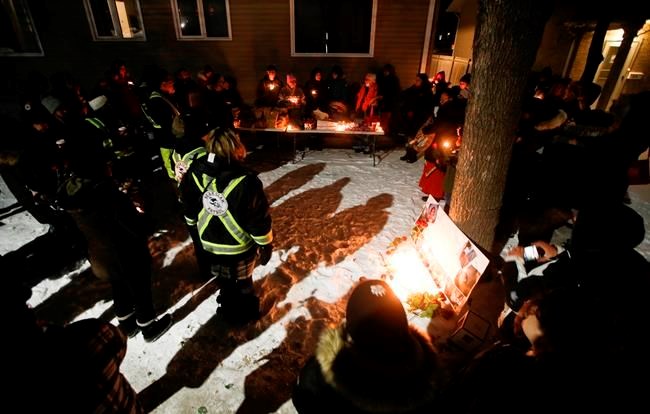WINNIPEG — The arrest of a man accused of killing four women, all believed to be Indigenous, shows vulnerable women and girls are subject to dangerous outcomes if governments don't work together to end gender and race-based violence, Indigenous advocates say.
Several Indigenous groups are urging governments and other institutions to fulfil the 231 Calls for Justice outlined in the final report from the National Inquiry into Missing and Murdered Indigenous Women and Girls released in 2019.
Each day of inaction has led directly to further harm and violence against Indigenous women, girls and two-spirit people, said Hilda Anderson-Pyrz, chair of the National Family and Survivors Circle.
"We must hold our governments and institutions to their promises to ensure measurable outcomes and concrete actions are in place," she said Friday. "They should really open their eyes and recognize the genocide that is continuing in this country."
Anderson-Pyrz is calling for the immediate appointment of a national ombudsperson to track complaints relating to Indigenous and human rights violations.
"I'm very angry at systems that have a responsibility to act and that are failing to act."
Winnipeg police on Thursday charged Jeremy Skibicki, 35, with first-degree murder in the deaths of Morgan Harris, 39, Marcedes Myran, 26, and an unidentified woman. Their bodies have not been found.
Skibicki was arrested and charged May 18 with first-degree murder in the death of Rebecca Contois, 24. Her partial remains were found in a garbage bin near an apartment building and police later found the rest of her remains in a Winnipeg landfill.
Contois, Harris and Myran are First Nations and police said they believe the fourth victim is Indigenous as well.
The Native Women's Association of Canada said the deaths show more action is needed across the country.
"They explain why the government cannot just hold an inquiry and say 'job done.' The inquiry was just the first step. Now it is time for serious action," the association said in a written statement.
The national inquiry called the murders and disappearances of Indigenous women genocide in its final report.
The federal government released its national action plan last year, which some criticized because of its lack of devoted funding, timelines or measurable goals.
The association released its own report card on the government's progressearlier this year and found little had been achieved.
Grand Chief Cathy Merrick with the Assembly of Manitoba Chiefs echoed calls for the federal and provincial governments to work with police to implement the inquiry's recommendations aimed at tackling root causes of violence against Indigenous women and girls.
The family advocate for the assembly said First Nations women are being failed.
"We continue to witness the vulnerability of our unsheltered women," Cora Morgan said in a statement.
"They feel their voices do not matter or their lives do not matter. Our women deserve more."
Crown-Indigenous Relations Minister Marc Miller said the federal government is failing in its responsibility to protect Indigenous women and girls, despite allocating money toward the issue.
"It's a legacy of a devastating history that has reverberations today," he said. "No one can stand in front of you with confidence to say that this won't happen again, and I think that's kind of shameful."
Contois lived in Winnipeg and was a member of the O-Chi-Chak-Ko-Sipi First Nation, also known as Crane River. Harris and Myran also lived in Winnipeg and were both members of Long Plain First Nation.
Police said Harris, Myran and Contois were killed in May. The unidentified victim is thought to have been killed on or about March 15. Police released a photo of a jacket similar to one she had been wearing.
Winnipeg has often been referred to as the epicentre of the crisis of violence against Indigenous women and girls.
Miller said the federal government will continue to work to address some of the systemic issues that put Indigenous women in vulnerable situations, including reforming the child-welfare system and opening more shelters.
"The federal government has a responsibility … despite the investments that we've put in — and they're significant," he said. "We are trailing in the face of a tragedy."
This report by The Canadian Press was first published Dec. 2, 2022.
Brittany Hobson, The Canadian Press



